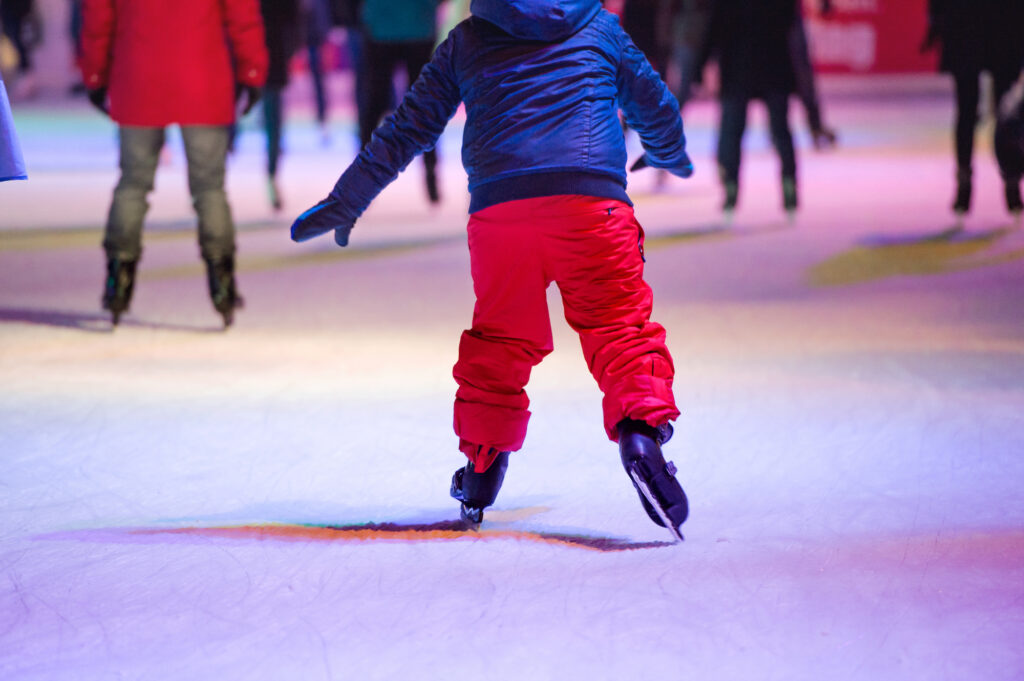
It’s time to dust off the skates! The Rothman Ice Rink is open, along with dozens of other rinks in the area. A seasonal favorite, ice-skating is the perfect holiday activity for families, groups of friends, and maybe even a first date. Whether for fun or for sport, if you plan on heading out to the rink this season you should know that it does come with a certain level of risk and can be potentially dangerous. Skating rink injuries are more common than not. Before you go out to the rink, you should be aware of the risk and what to do in the event that an accident happens.
Common Skating Rink Injuries
The perfect recipe for an accident to occur? A slick surface and sharp bladed skates. Given the nature of the sport, injuries related to slips and falls are common and more so expected. This would account for injuries such as light bruising, minor lacerations, and muscle soreness. Yet, if specific rules and guidelines are not followed by the business owner or skater, more severe injuries may occur. Injuries ranging from fractures and sprains to severe head and facial injuries are unfortunately also common at many ice rinks. This is why you will most likely see numerous warning signs, guidelines, and traffic signs posted in various locations throughout the ice rink premise and facility.
Duty of the Skater
No matter your skill level or experience, you have a duty to follow all the rules and use reasonable judgment when going to an ice-rink. This means skating at the indicated speed, following the indicated traffic pattern, and following all signs and warnings posted at the rink. Doing anything outside of what a patron with reasonable judgment would do could bar you from pursuing a personal injury claim.
Additionally, you should be aware of your own physical limitations and abilities before stepping onto the ice. If you are still recovering from a previous injury or are attempting jumps above your skill level, for example, it will be taken into account if you decide to file a claim. If you choose to bring your own equipment, it is up to you to make sure it is properly adjusted and sized. You are also responsible for wearing adequate clothing for the environment.
Intentional Tort
It’s not uncommon for young kids and teenagers, especially, to try and mess with their friends or other siblings. Making someone else fall or trip might get a few laughs, but if that person ends up injured there could be consequences if the injured party decides to take action. Another note for skaters is that you could be held liable for another skater’s injuries under the intentional tort theory. Liability for intentionally pushing someone from behind or causing them to lose balance and injuring themselves would not fall on the rink operator. It would fall on the skater responsible for the injuries of the plaintiff, or an employee for that matter.
Generally, proving a tort is going to be harder than proving negligence. There are three types of intent a plaintiff may be required to show in an intentional tort case, including willfulness, knowingly causing harm or recklessness. The plaintiff must prove that the defendant meant to hurt them, understood the actions taken would result in harm or acted without showing any caution. If any of these requirements are met, you may have an intentional tort on your hands.
Duty of the Operator
Patrons have a duty to foster a safe environment based on their own actions when at an ice rink, but so does the business owner. The state of New Jersey has the Roller-Skating Rink Safety and Fair Liability Act, which outlines the requirements and duties of rink owners in order to maintain a safe environment. Though New Jersey is the only state with a law specifically for ice skating rinks, many of the requirements are applicable to any state under premise liability.
Owners and operators are responsible for keeping the ice-skating rink safe for patrons, including general maintenance of the facility and equipment. For example, keeping the rink surface free from debris and tending to any potential risk on the premise. An operator who fails to identify and remedy a risk that directly causes the injury of a patron will be held liable.
Common Defenses for Ice-Skating Rink Injuries
If you find yourself injured at an ice-skating rink, chances are the defendant will claim “assumption of risk.” All patrons assume the risk of a certain amount of slipping, falling, and bumping. However, the assumption of risk cannot be applied to every ice-skating injury.
Another defense that you might encounter is contributory or comparative negligence. Depending on which law your state follows, the plaintiff’s recovered damages could be reduced significantly or barred altogether is they are found responsible for any part of their injury.
What to Do
If you have been injured at an ice rink and believe it was not your own doing, the next steps are similar to any other personal injury case, including what to do after a slip and fall accident. You should immediately bring your situation to the business owner’s attention and then seek medical assistance. Your health and well-being should always be top priority. Plus, big or small, having medical documentation from a professional will serve fruitful if you do end up having a case. If your symptoms do not appear right away, seek medical assistance as soon as you notice them. From there, you may need the help of an experienced personal injury attorney to ensure you get the compensation you deserve.
Contact Us
Ice-skating injuries can sometimes be serious and may require legal action to resolve any issues. If you or a loved one suffers from an injury at the ice-skating rink this season due to the negligence of the business owner or another patron, don’t hesitate to contact one of our attorneys. At The Cochran Firm we will serve your best interests and are committed to getting you every penny you deserve. The case evaluation is always free. Give us a call at 1-800-THE-FIRM to schedule your consultation.
